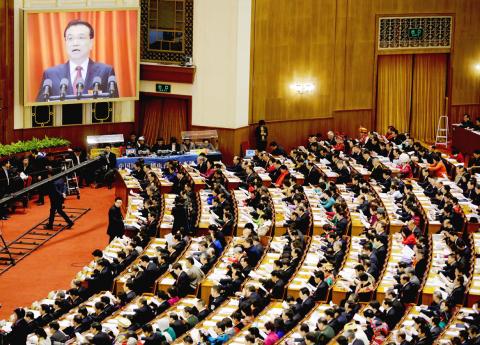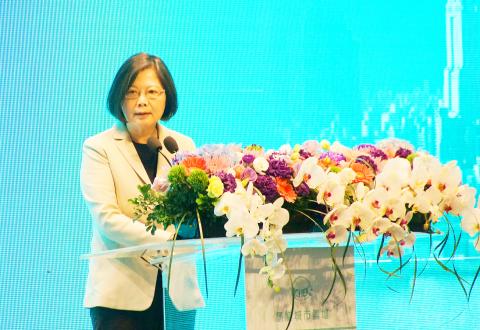Politicians in Taiwan backed the “status quo” yesterday after Beijing stepped up its rhetoric against Taiwanese independence, with Chinese Premier Li Keqiang (李克強) warning against “separatist activities” and pledging to safeguard China’s “territorial integrity.”
The Democratic Progressive Party (DPP) played down Li’s remarks that a peaceful and stable relationship across the Taiwan Strait should be developed under the so-called “1992 consensus” and that both sides are “part of one big family.”
“The DPP’s cross-strait policy is to maintain the status quo as president-elect Tsai [Ing-wen, 蔡英文] proposed,” DPP spokesperson Wang Min-sheng (王閔生) said.

Photo: AP
“This is not only in line with mainstream public opinion in Taiwan, but would also maintain regional stability,” Wang said.
Wang said that Tsai’s definition of the “status quo” relates to the democratic and free state of Taiwan and the peaceful relationship across the Taiwan Strait.
The Mainland Affairs Council said the government’s “mainland policy” is to maintain the “status quo” of “no unification, no independence and no armed conflict” across the Taiwan Strait, while pushing for peaceful and stable developments based on the “1992 consensus.”

Photo: CNA
The council said that the “mainland policy” should be created in line with the framework of the Republic of China (ROC) Constitution.
New Power Party Legislator Freddy Lim (林昶佐) said he “is not particularly surprised” by China’s warning, adding that there is no need to “overreact” to new references to China’s resolve to oppose Taiwanese independence.
“They are always reiterating their stance and I think we should just treat it calmly to try to normalize it,” Lim said.
“After all, China is just one country,” he said, downplaying Li’s referring to both sides of the strait as a “family.”
Cross-strait “interaction and communication does not rely upon whether we are of the same so-called ‘family’ — we do not engage in dialogue with Japan and the US because they are closer ‘family,’” he said.
Li said at the opening of the Chinese National People’s Congress that Beijing plans to “oppose separatist activities for the independence of Taiwan” and “safeguard China’s sovereignty and territorial integrity.”
Both clauses were additions to remarks he made on the issue at last year’s National People’s Congress.
Beijing has repeatedly asserted its belief in the “1992 consensus,” a term former council chairman Su Chi (蘇起) admitted making up in 2000, which refers to a tacit understanding between the Chinese Nationalist Party (KMT) and the Chinese government that both sides of the Taiwan Strait acknowledge there is “one China,” with each side having its own interpretation of what “China” means.
Li spoke of people on both sides of the Taiwan Strait as “fellow compatriots” belonging to “one and the same family,” sharing a “common destiny.”
The phrasing echoed Chinese President Xi Jinping’s (習近平) rhetoric from November last year, when President Ma Ying-jeou (馬英九) and the Chinese leader reached across decades of Cold War-era estrangement and rivalry to exchange a historic handshake in the first summit since 1949.
“We are brothers connected by flesh, even if our bones are broken,” Xi said then. “We are a family whose blood is thicker than water.”

NATIONAL SECURITY THREAT: An official said that Guan Guan’s comments had gone beyond the threshold of free speech, as she advocated for the destruction of the ROC China-born media influencer Guan Guan’s (關關) residency permit has been revoked for repeatedly posting pro-China content that threatens national security, the National Immigration Agency said yesterday. Guan Guan has said many controversial things in her videos posted to Douyin (抖音), including “the red flag will soon be painted all over Taiwan” and “Taiwan is an inseparable part of China,” while expressing hope for expedited “reunification.” The agency received multiple reports alleging that Guan Guan had advocated for armed reunification last year. After investigating, the agency last month issued a notice requiring her to appear and account for her actions. Guan Guan appeared as required,

A strong cold air mass is expected to arrive tonight, bringing a change in weather and a drop in temperature, the Central Weather Administration (CWA) said. The coldest time would be early on Thursday morning, with temperatures in some areas dipping as low as 8°C, it said. Daytime highs yesterday were 22°C to 24°C in northern and eastern Taiwan, and about 25°C to 28°C in the central and southern regions, it said. However, nighttime lows would dip to about 15°C to 16°C in central and northern Taiwan as well as the northeast, and 17°C to 19°C elsewhere, it said. Tropical Storm Nokaen, currently

‘NATO-PLUS’: ‘Our strategic partners in the Indo-Pacific are facing increasing aggression by the Chinese Communist Party,’ US Representative Rob Wittman said The US House of Representatives on Monday released its version of the Consolidated Appropriations Act, which includes US$1.15 billion to support security cooperation with Taiwan. The omnibus act, covering US$1.2 trillion of spending, allocates US$1 billion for the Taiwan Security Cooperation Initiative, as well as US$150 million for the replacement of defense articles and reimbursement of defense services provided to Taiwan. The fund allocations were based on the US National Defense Authorization Act for fiscal 2026 that was passed by the US Congress last month and authorized up to US$1 billion to the US Defense Security Cooperation Agency in support of the

PAPERS, PLEASE: The gang exploited the high value of the passports, selling them at inflated prices to Chinese buyers, who would treat them as ‘invisibility cloaks’ The Yilan District Court has handed four members of a syndicate prison terms ranging from one year and two months to two years and two months for their involvement in a scheme to purchase Taiwanese passports and resell them abroad at a massive markup. A Chinese human smuggling syndicate purchased Taiwanese passports through local criminal networks, exploiting the passports’ visa-free travel privileges to turn a profit of more than 20 times the original price, the court said. Such criminal organizations enable people to impersonate Taiwanese when entering and exiting Taiwan and other countries, undermining social order and the credibility of the nation’s